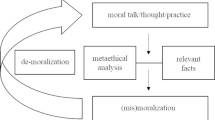Abstract
Societies vary in their levels of social inequality and in the degree of popular support for policies that reduce disparities within them. Survey research in Texas, where levels of disparity in health and medical care are relatively high, studied how psychological mechanisms of moral disengagement relate to public support for expanding access to government-subsidized health care. Telephone interviews (N = 1,063) measured agreement with statements expressing tendencies to minimize the effects of inequality, blame its victims and morally justify limits on government help. The interviews also assessed support for general and specific policies to reduce inequality, e.g., through state-subsidized health care for lower income groups, as well as political party affiliation, ideological orientation, gender, age, education and income. Agreement with beliefs expressing moral disengagement was associated with opposition to governmental policies to reduce inequality in children’s health care. Beliefs that justify the withholding of government assistance, blame the victims of societal inequality, and minimize perceptions of their suffering were strongly related to variation between and within groups in support for governmental action to reduce inequality.
Similar content being viewed by others
References
Bandura A (1999) Moral disengagement in the perpetration of inhumanities. Pers Soc Psychol Rev 3:193–209
D’Souza D (1995) The end of racism. Free Press, NY
Gans H (1995) The war against the poor. Basic Books, NY
Jost JT, Banaji MR, Nosek BA (2004) A decade of systems-justification theory. Polit Psychol 25(6):881–900
Mead LM (ed) (1997) The new paternalism. Brookings Institution, Washington, DC
Micklethwait J, Wooldridge A (2004) The right nation: conservative power in America. Penguin, New York
Mitka M (2008) States show wide discrepancies in quality of health care for US children. J Am Med Assoc 300(2):159
Olasky M (1992) The tragedy of American compassion. Regnery, Washington, DC
Pettigrew TF, Meertens RW (1995) Subtle and blatant prejudice in western Europe. Eur J Soc Psychol 25(1):57–75
Sears DO, Henry PJ (2003) The origins of symbolic racism. J Pers Soc Psychol 85(2):259–275
Smith TW (1990) Ethnic images. University of Chicago, National Opinion Research Center
Tarlov AR, St Peter RF (2000) The society and population health reader: a state and community perspective. The New Press, New York
Acknowledgment
Research supported in part by the US National Institutes of Health (R21 HD40067).
Author information
Authors and Affiliations
Corresponding author
Rights and permissions
About this article
Cite this article
McAlister, A.L. Moral disengagement and tolerance for health care inequality in Texas. Mind Soc 9, 25–29 (2010). https://doi.org/10.1007/s11299-009-0065-2
Received:
Accepted:
Published:
Issue Date:
DOI: https://doi.org/10.1007/s11299-009-0065-2




